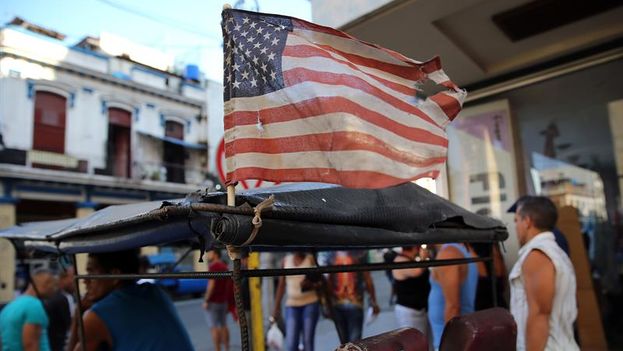
![]() 14ymedio, Havana, 15 March 2016 — It was an open secret that the United States would approve a new package of relaxations before Barack Obama’s official visit to Cuba. However, the new measures that widen Cubans’ access to the dollar and the ability of Americans to visit the island have taken some by surprise, among them the official press which, two hours after making the information public, still hasn’t reacted.
14ymedio, Havana, 15 March 2016 — It was an open secret that the United States would approve a new package of relaxations before Barack Obama’s official visit to Cuba. However, the new measures that widen Cubans’ access to the dollar and the ability of Americans to visit the island have taken some by surprise, among them the official press which, two hours after making the information public, still hasn’t reacted.
On the streets the rumor is just starting to get out that “the yumas (Americans) opened up the fulas (bucks),” a reference to the authorization to use the U.S. dollar from Cuba, and the new ability for residents of the island to maintain bank accounts in the United States. Amid the daily hardships, many cling to the hope that “Obama’s package-attack,” as it was baptized by a taxi driver this morning, will improve their lives.
Among the amendments that are beginning to spark the most excitement is the possibility that United States companies can engage in transactions “related to sponsorship or contracting with Cuban citizens to work or provide services in the United States,” a measure that benefits athletes, artists and other professional sectors.
Moises is 39 and drives a horse-drawn carriage for tourists around Havana’s Central Park. “I just heard about it because a customer heard it on TV in the hotel,” he told this newspaper. He has a degree in mechanical engineering, and hopes “to get a pinchita (visa) to come and go… I don’t want to stay permanently, but I would like to earn some money over there and live over here,” he explains.
Near the Plaza de Armas, the booksellers only have time to think about their own problems. The authorities in Old Havana have warned them they can’t set up there between 15 and 23 March. “It’s all about Obama’s visit,” complains one who sells books from the fifties and sixties. His daughter, who works in the food industry near the airport has also been told her workplace will be closed until after the visit of the US president.
Despite the inconvenience and the loss of money it means, the bookseller is happy with the new measures. “At last some good news, thank God, because the truth is we’ve had a tremendous bad patch of problems,” he says, cheerfully. Next to him is Osmel, another bookseller who has been selling there for more than a decade. “For my business this is very welcome because it means more trade and probably more tourists. Maybe now they’ll bring more greenbacks to the country,” he speculates.
Among members of the independent civil society, opinions have not been slow in coming. Dagoberto Valdes, director of the magazine Coexistence, believes the new relaxations are consistent “with the policy put in practice in Washington.” However, he demands that “in return, the Cuban government should now end the tax imposed on the dollar, which they justified by the difficulties that existed (in exchanging it) until today.”
Manuel Cuesta Morua, leader of the Progressive Arc, also applauded the gesture. “This is excellent news that indicates the acceleration of the normalization process and it will allow Cuba to better integrate itself into the global economy,” he says. A regime opponent and coordinator of initiatives such as the Otro18 (Another 2018) campaign, Cuesta Morua believes that “the world opening itself to Cuba implies the United States opening itself and that is what is happening.”
“The house of cards constructed by the government over the last fifty-some years to prevent Cubans from connecting to the world is falling down,” added Cuesta Morua.
Activist Miriam Leiva consider it “timely and positive” that Cubans can now use the dollar in banking transactions, because that opens the opportunity for American companies to buy in Cuba companies and also Cuban citizens can import or export goods, not just the self-employed. “What I think is important is that the Cuban government open the possibility to Cubans to enjoy the new measures, that is that it be not only useful for the state, but also for citizen transactions. In short, it is necessary that there be reciprocity with this measure,” she adds.
Satisfaction among the tourists was also evident this morning, as bit by bit they heard the news. Dominic, a German photographer who was waiting for the planting of the new ceiba tree at Havana’s El Templete, believes that news like today’s before the coming of Barack Obama is a hopeful sign. “I’m happy to be in Havana on a historic day, I hope that when I return the economic improvement resulting from a decision of this nature will be noticeable,” he adds.
An artisan on Obispo Street said he didn’t know if the news coming from Washington will be good or bad for Cuba. “To comment on that you have to be an economist, but for me it would be good if, in addition to the Americans ending the ban on using their currency, the government here allowed it to circulate freely and the currency exchanges gave you the real value for it.”
However, skepticism also abounds. “No one can fix this”, said a man who, broom in hand, was trying to remove fallen leaves around the statue of Carlos Manuel de Céspedes, in the center of the square. Near him some were throwing coins – Cuban pesos or Cuban convertible pesos – into the hole where the ceiba will be planted in Havana this Tuesday.
